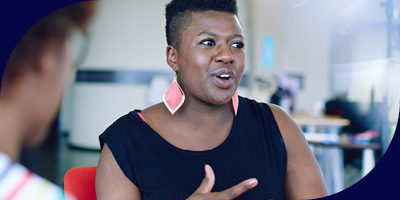Climate action
About this trend
Learning professionals have an important role to play in helping organisations develop the skills, behaviours, culture, products and services to drive sustainability. What is good for the climate is also good for business. If L&D can foster a culture of innovation, of problem-solving, of trying to make products and services better, then it is helping organisations thrive, while also making them greener.
They have an equally important role to play in educating employees about what can be done to address climate change and how individual and collective action can have a positive impact.
Educating people about the causes and consequences of climate change empowers them to make informed decisions and take meaningful action to mitigate its effect. Employees want this – they want to see that their employer is taking steps to reduce their carbon footprint and want to be able to do their bit too.
L&D can really help with that education piece. Employees need to understand how their contribution can help their organisation be more sustainable. For example, encouraging and enabling employees to innovate - to think of new ways to reduce waste in the system, to make a product more effective and efficient, to be more environmentally friendly in how they work…
Getting employees on board helps reduce climate anxiety, something that is felt and expressed by many employees, across all generations. There are numerous studies with the same findings: employees are deeply concerned about climate change and think their employer isn’t doing enough (or anything) to address it. People want their employers to take action. They want to work for an employer that cares about the environment. By empowering employees and organisations to take positive action, L&D can help address some of that anxiety and improve employee wellbeing.
Learning teams are well placed to drive awareness-raising initiatives. The Innovating Pedagogy report talks about ‘empowering individuals to become agents of change in the fight against climate change’. L&D is used to doing this – finding people around the business who want to be agents for change and will be willing advocates and agitators. The report also talks about fostering environmental care. Again, L&D can help here – finding subject matter experts in and outside the organisation and bringing them together, enabling employees to engage in climate-friendly activities through volunteering days, organising green initiatives, etc. There is a lot L&D can do.
The expert view
Tess Robinson, Director at digital learning company LAS (LearningAge Solutions)

L&D has the skills that could really move the dial on climate action in organisations, but it’s not something that has been talked about much. That is changing. Interest in climate action is growing in L&D at the moment. For example, I, with a handful of other interested L&D professionals, set up an industry-led group called Green L&D in 2022 and it has over 200 members already. And some of the big UK industry conferences now have it on their agenda.
In L&D, it all tends to be about AI currently. But actually, AI is potentially problematic energy-wise. Sam Altman, CEO at OpenAI, said there isn’t enough energy in the world at the moment to power the future demand for AI (https://www.reuters.com/technology/openai-ceo-altman-says-davos-future-ai-depends-energy-breakthrough-2024-01-16/), so that’s a real challenge for organisations.
There are three good reasons why L&D needs to get involved with climate action:
- It has skills that can make a difference
- Because the types of technology we might use have a big impact on the climate
- Because sustainability is strategically important for organisations
I think L&D should be playing in that strategically important space.
Sustainability as a topic is difficult, because it’s a bit nebulous, it’s existential and it’s scary. It means different things to different people, so it’s quite hard to get to the crux of what it means for your organisation. That’s an area L&D can help in. L&D is really good at things like behaviour change, skills, communication, community-building, bringing people together to share ideas, storytelling, motivating people by focusing on the emotional aspect…But I’m not sure that L&D has worked out how to map that onto what needs to be done for sustainability.
L&D can help organisations develop the skills to be future-fit – skills such as creative thinking, analytical skills, fostering innovation, problem solving, etc. These skills will help us solve these big challenges and make organisations robust.
It’s a scary topic, so people easily feel overwhelmed, affecting their wellbeing. L&D can help by helping people feel in control, by educating them about what they can do within their own context.
L&D people have all these skills in their toolbox and they become very powerful when talking about an emotive topic like climate change.
Top tips:
- Do some learning to get yourself up to speed. Educate yourself by reading about it and being interested in it. It’s a difficult, complex area to get your head around and there’s so much information. I did some training with the Carbon Literacy Project and that was really good.
- Think about the skills you have as an L&D professional and how you could use them to support sustainability initiatives in your organisation.
- Find out what your organisation is already doing, what it’d like to do and what it could do.
- Join a community of interested professionals, somewhere where you can share best practice and ideas and help each other.
- Build relationships with people who are involved in leading sustainability in your organisation – ESG teams, legal teams, risk teams, innovation teams, etc.
People understand that climate change is an issue, but how much do they actually understand it in their context, in the workplace? Or feel confident to lead or engage with activities around climate action at work?
Professor Agnes Kukulska-Hulme
Institute of Educational Technology, The Open University
Resources:
- United Nations. What is climate change?: https://www.un.org/en/climatechange/what-is-climate-change
- The Open University. Supporting climate action through digital education: https://www.open.edu/openlearn/education-development/supporting-climate-action-through-digital-education/
- Supporting Climate Education Through a Novel Framework of Climate Kind Pedagogy: https://climatesolutions.ubc.ca/news-and-events/events/supporting-climate-education-through-novel-framework-climate-kind-pedagogy
Read the original report behind Trends in Learning
|
The Innovating Pedagogy report is an annual report co-authored by academics at the OU's Institute of Educational Technology, and this year, together with researchers from the LIVE Learning Innovation Incubator at Vanderbilt University in the US. |
Please contact us to speak to one of our business team advisors.
Not on our mailing list?
Sign up to receive regular emails that are full of advice and resources to support staff development in your organisation.








